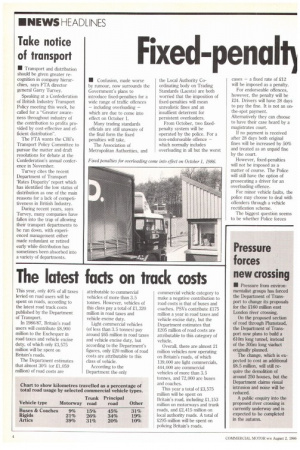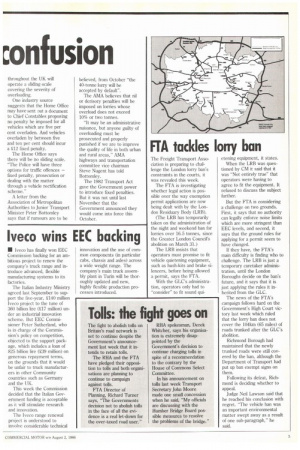Fixedlenalti confusion
Page 6

Page 7

If you've noticed an error in this article please click here to report it so we can fix it.
• Confusion, made worse by rumour, now surrounds the Government's plans to introduce fixed-penalties for a wide range of traffic offences — including overloading — which are due to come into effect on October 1.
Many trading standards officials are still unaware of the final form the fixed penalties will take.
The Association of Metropolitan Authorities, and the Local Authority Coordinating body on Trading Standards (Lacots) are both worried that the imposition of fixed-penalties will mean unrealistic fines and an insuffient deterrent for persistent overloaders.
From October, two fixedpenalty system will be operated by the police. For a non-endorseable offence — which normally includes overloading in all but the worst
cases — a fixed rate of £12 will be imposed as a penalty.
For endorseable offences, however, the penalty will be £24. Drivers will have 28 days to pay the fine. It is not an onthe-spot payment. Alternatively they can choose to have their case heard by a magistrates court.
If no payment is received after 28 days both original fines will be increased by 50% and treated as an unpaid fine by the court.
However, fixed-penalties will not be imposed as a matter of course. The Police will still have the option of prosecuting a driver for an overloading offence.
For minor vehicle faults, the police may choose to deal with offenders through a vehicle rectification scheme.
The biggest question seems to be whether Police forces throughout the UK will operate a sliding-scale covering the severity of overloading.
One industry source suggests that the Home Office may have sent out a document to Chief Constables proposing no penalty be imposed for all vehicles which are five per cent overladen. And vehicles overladen by between five and ten per cent should incur a £12 fixed penalty.
The Home Office says there will be no sliding scale. "The Police will have three options for traffic offences — fixed penalty, prosecution or dealing with the matter through a vehicle rectification scheme."
A letter from the Association of Metropolitan Authorities to Junior Transport Minister Peter Bottomley says that if rumours are to be believed, from October "the 40-tonne lorry will be accepted by default".
The AMA believes that nil or derisory penalties will be imposed on lorries whose overload does not exceed 10% or two tonnes.
"It may be an administrative nuisance, but anyone guilty of overloading must be prosecuted and properly punished if we are to improve the quality of life in both urban and rural areas," AMA highways and transportation committee vice chairman Steve Nugent has told Bottomley.
The 1982 Transport Act gave the Government power to introduce fixed penalties. But it was not until last November that the Government announced they would come into force this October.












































































